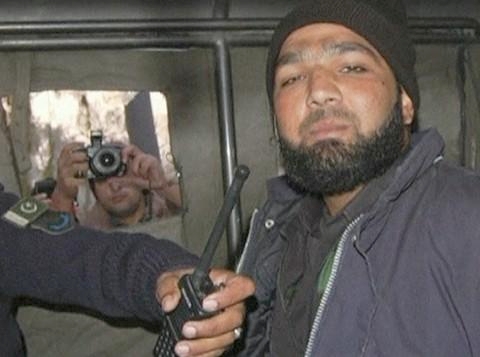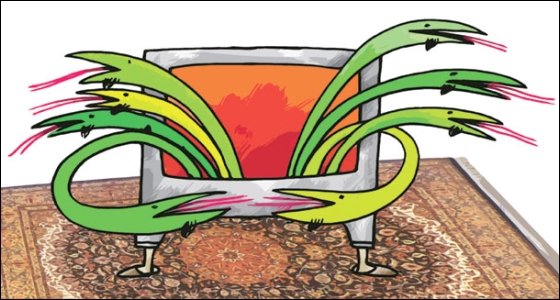--- The Cutting Edge News
Inside IslamBangladesh’s Secular Democracy Struggles with Violent Radical IslamBenedict Rogers November 24th 2008
Cutting Edge Burma Desk
Bangladesh is a country associated more with floods, cyclones and poverty than terrorism or radical Islamism. Indeed, it is a country founded on secular, democratic values and widely regarded as a moderate Muslim state. In recent years, however, militant Islamism has quietly been taking ground – and Bangladesh’s survival as a progressive state is on a knife-edge.
The warning signs have been there for some years, and some commentators have been sounding the alarm. In 2002, Ruth Baldwin wrote a piece in The Nation headlined: “The ‘Talibanisation’ of Bangladesh.” Hiranmay Karlekar wrote Bangladesh: The Next Afghanistan? While Maneeza Hossain’s Broken Pendulum: Bangladesh’s Swing to Radicalism and Ali Riaz’s God Willing: The Politics of Islamism in Bangladesh are all important contributions.
Perhaps the most visible and dramatic sign of the growth of extremism came three years ago. On 17 August 2005, between 11 and 11.30 am, 527 bombs were exploded in a massive attack on all but one of the country’s 64 districts. Such a carefully co-ordinated campaign of terror shocked the nation – but in many respects it was just the tip of the terror iceberg. Other terrorist incidents, including an attack on the Bangladeshi-born British High Commissioner, members of the judiciary and sporadic attacks on religious and ethnic minorities are further indicators of the presence of well-organised terrorist networks.
However, it is not simply the acts of violence that should cause concern. The Islamists’ ideological influence has spread to almost all parts of Bangladeshi society – not least the political arena.
The umbrella organisation is Jamaat-e-Islami, a radical group founded in India in 1941 by Mawlana Abul Ala Maududi. According to one analyst in Bangladesh, Jamaat’s objective is to create “a monolithic Islamic state, based on Shari’ah law, and declare jihad against Hindus, Buddhists, Christians and free-thinking Muslims.” Religious minorities – and Muslims regarded by Jamaat as heretical, such as the Ahmadiyya sect – are targeted for eviction, according to one human rights activist, “or at least to be made into a ‘non-existent’ element whose voice cannot be heard.” Jamaat’s tentacles now reach into major sectors, including banking, health care, education, business and non-profit organisations, and they aim to “destroy” the judicial system, according to one critic, including by “physically eliminating judges.” In 2001, Jamaat won 17 parliamentary seats in alliance with the governing party, the Bangladesh National Party (BNP), and became a partner in the coalition government until its overthrow by the military in 2007. Elections scheduled for next month could result in Jamaat’s return to government, if BNP wins, and even in the current caretaker administration there are believed to be Jamaat-sympathisers.
While Jamaat is the umbrella, according to journalist Shahriar Kabir and the Forum for Secular Bangladesh there are over 100 Islamist political parties and militant organisations in Bangladesh. Only four of these have been banned, and even they continue to operate under alternative names. Extremist literature, audio and video cassettes are widely distributed, and thousands of madrassas teach radical Islamism.
All this is completely at odds with the vision of Bangladesh’s founder, Sheikh Mujibur Rahman, who led the struggle for independence from Pakistan in which at least three million were killed, ten million displaced and 250,000 women raped. According to Hiranmay Karlekar, at the heart of the birth of Bangladesh was a belief that “the Bengali identity had prevailed over the Islamic identity.” The preamble of the first constitution explicitly stated a commitment to secularism and democracy, and political parties were banned from using religion as a basis for their activities.
Bangladesh began sliding slowly towards Islamism following the assassination of Rahman in 1975. In 1977, references to secularism were deleted from the constitution and the phrase “Bismillah-Ar-Rahiman-Ar Rahim” (“In the name of Allah, the Beneficient, the Merciful) was inserted. Five years later, General Ershad – one of the military dictators who ruled the country in the alternating competition between the army and the democrats – introduced the Eighth Amendment, making Islam the state religion. The constitution now states that “absolute trust and faith in the Almighty Allah shall be the basis of all actions.”
There remain some provisos, which give religious minorities protection. For example, while Islamic principles are set out as guiding values, the constitution states that they “shall not be judicially enforceable.” The Chief Justice has said clearly that Shari’ah does not constitute the basis of the country’s legislation. Religious freedom, including “the right to profess, practice or propagate any religion”, is protected, and discrimination on religious grounds prohibited.
Nevertheless, in practice Christians, Hindus and Buddhists are denied promotion in the government and the military and in the view of one Bangladeshi journalist, religious and ethnic minorities have seen “unprecedented persecution” in recent years.
In 1998, for example, three Christian sites in Dhaka were attacked – a Catholic girls’ school, an Anglican church and a Baptist church. A mob set fire to the school, destroyed property, burned books, pulled down a cross and smashed statues of the Virgin Mary and St Francis of Assisi. Death threats were issued from the nearby mosque. Since then, sporadic attacks on churches have escalated. In 2007, at least five churches were attacked. Hindus and Ahmadiyyas face similar violence.
Cases of abduction, rape, forced marriage and forced conversion of religious minority women – and particularly young girls – are increasing, in a trend worryingly reminiscent of Pakistan. On 13 February 2007, for example, Shantona Rozario, an 18 year-old Christian student, was kidnapped. She was forced at gunpoint to sign a marriage document with her kidnapper, and an affidavit for conversion to Islam, witnessed by a lawyer, a mullah and a group of young men. After a month she managed to escape, but others are not so fortunate. On April 30 of this year a 14 year-old Christian girl, Bituni de Silva, was raped at gunpoint, and on May 2 a 13 year-old daughter of a pastor was gang-raped.
Apostates in Bangladesh face similar severe consequences for leaving Islam as they do throughout the world. On 1 February this year, a 70 year-old woman convert to Christianity from Islam, Rahima Beoa, died from burns suffered when her home was set ablaze after her conversion.
In 2004, a Jamaat Member of Parliament attempted to introduce a blasphemy law in Bangladesh, modelled on Pakistan’s notorious legislation. Attempts have been made to ban Ahmadiyya literature. And even during the State of Emergency, when protests and processions are supposed to be banned, extremists led by groups such as Hizb-ut-Tahrir have held angry rallies. On 17 September 2007, for example, a cartoon was published in a satirical magazine, Alpin, featuring a conversation between a child and an imam, in which the boy was told that he should always use the prefix ‘Mohammed’ before a name. The boy then decided to call his cat “Mohammed Cat.” The cartoon sparked outrage, and effiges of the newspaper editor were burned in street protests. The cartoonist and the editor were arrested, charged with sedition, and the publication was closed down. In April this year, large protests were held after Friday prayers in major cities, opposing the government’s plans to legitimate women’s rights in the constitution. Maulana Fazlul Haq, chairman of the Islami Oikya Jote, described such a policy as “anti-Qu’ran” and “anti-Islamic.”
An estimated 2.5 million people in Bangladesh belong to indigenous ethnic tribal groups, sometime sknown as “Adibashis.” There are at least 40 different ethnic groups, mainly inhabiting the Chittagong Hill Tracts and the plains area around Mymensingh. Most of these tribal groups are non-Muslim – predominantly Buddhist, Christian and Animist. Since the late 1970s, the Bangladeshi government has actively sponsored the resettlement of Bengali Muslims into the tribal areas – resulting in the construction of mosques, land-grabbing, evictions and discrimination against non-Muslims. One indigenous rights campaigner said: “Our way of life is an open society. Men and women can work anywhere. We are more flexible on gender issues. But the settlers have come in and built mosques, and they use their loudspeakers which affects us culturally and psychologically.”
In one village near Mymensingh, for example, a Bengali Muslim married a Christian from a tribal group. All the other villagers are Christians. After a few years, he decided he needed a mosque – even though he was the only Muslim in the area. So now he is building a mosque – and the likelihood is he will bring in an imam, who will bring his family, who will bring their relatives: and the slow, subtle, insidious repopulation of a non-Muslim, non-Bengali area will unfold. When I visited the remote jungle village, the atmosphere was tense – and the imam, sitting at the mosque construction site, was unwelcoming.
The prediction of Bangladesh’s “Talibanisation” may sound extreme, and in the immediate term the likelihood of Bangladesh becoming like Afghanistan is far-fetched. Bangladesh has not gone as far down the road of radicalisation as Pakistan, for example. Nevertheless, the warnings need to be taken seriously. If it continues as it is, Bangladesh will go the way of Pakistan – and then the risk of Talibanisation becomes realistic.
Indeed, it is Pakistan and Saudi Arabia that are fuelling the Islamisation of Bangladesh. As one person put it, “Pakistan is the breeding ground and the brain, and Saudi Arabia provides the money.” Saudi Arabia is a major funder of madrassas and mosques in Bangladesh, for example – and it is no coincide that Wahhabi teaching is on the rise.
A prominent church leader predicts that full Shari’ah law will be implemented if the situation does not change. “Some day, it will happen. Maybe not immediately, but it will happen … The support of voices in the international community is very much needed. More people need to come and find out what is happening here.” As Ali Riaz says, “there is no doubt that if the present trend continues, the nation will inevitably slide further down the slope toward a regime with a clear Islamist agenda … What is necessary is a decisive change in the direction of the nation.” Such a decisive change is vital, to restore the founding principles of Bangladesh – secularism, democracy, equal rights. There is still a thriving civil society, with bold intellectuals, journalists and human rights activists willing to challenge radical Islamism – and that is a cause for hope. Bangladesh has not been lost to radical Islamism completely – but it will be if the alarm bells are not heard.
Cutting Edge Contributor Benedict Rogers is a human rights activist with Christian Solidarity Worldwide, and serves as Deputy Chairman of the UK Conservative Party's Human Rights Commission. He is the author of A Land Without Evil: Stopping the Genocide of Burma's Karen People (Monarch, 2004).
URL:
www.thecuttingedgenews.com/index.php?...e=Features


















